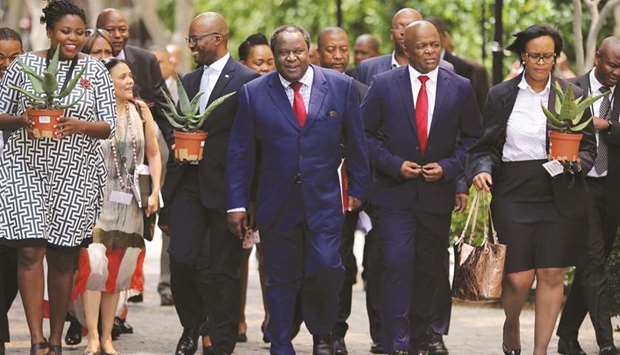South Africa’s Finance Minister Tito Mboweni yesterday announced a $1.6bn-a-year bailout for the country’s electricity utility in a bid to stave off further downgrades to Pretoria’s credit rating as he unveiled a new budget.
Credit ratings agencies have warned that state power utility Eskom’s $30bn debt crisis could spark credit rating downgrades which would embarrass President Cyril Ramaphosa as he prepares for nationwide elections on May 8.
“We must prune and pluck away at the rot until there is growth,” said Mboweni, brandishing a South African bitter aloe plant in the parliament chamber in Cape Town to illustrate his point.
“It will not be easy, there will be no quick fixes, but we are ready.”
Maintenance issues at Eskom’s power plants plunged swathes of the country into darkness this month as the utility implemented rolling blackouts and struggled to restore supplies.
The crisis has quickly become a leading election battleground issue, with the main opposition Democratic Alliance (DA) calling for Eskom’s privatisation.
“Instead of taking bold and decisive action it was a lipstick budget...it looked pretty on the outside but we need a plan. We should be selling (Eskom),” said DA leader Mmusi Maimane after the speech.
Mboweni also hiked taxes on cigarettes and beer by 7% and increased duty on a litre of fuel by roughly $0.02 per litre in order to plug an expected 15.4bn rand ($1.08bn) shortfall in tax revenue for the past year.
“I feel as South Africans we need our alcohol and our cigarettes to function. It doesn’t matter how much it costs, we are still going to buy,” said a luxury handbag saleswoman who declined to be named. “The more difficult life gets for us as South Africans, the more we drink and smoke.”
Money was also announced for infrastructure projects, including provincial schools and agriculture projects that will appeal to the ruling African National Congress’ (ANC) rural electoral base.
Mboweni delivered his maiden budget wearing a blue and white checked shirt, red tie and blue jacket, often pausing to quote the Bible.
Analysts had warned ahead of the speech that tensions may emerge in the ruling ANC-led coalition if he announced job cuts at Eskom.
But Mboweni stopped short of calling for lay-offs, instead pleading for reductions in the state wage bill.
“Reforms at Eskom and other state-owned enterprises such as South African Airways (could unite opposition) against Ramaphosa. The faction still has significant representation,” said Darias Jonker, an analyst at the Eurasia Group think-tank.
Ramaphosa had announced that the electric company would be divided into three separate companies, but unions rejected the proposal, insisting it would lead to job cuts.
Mboweni said state-owned companies, including Eskom, “pose very serious risks to the fiscal framework”.
“Isn’t it about time the country asks the question: do we still need these enterprises?” Mboweni said.
“If we do, can we manage them better? If we don’t need them, what should we do?”
Graduate Shai Abrahams, 20, complained about the prospect of further power cuts.
“It’s coming to winter just now,” she said. “So if this money could help them then I really think they should use it.”
Fears are mounting that if Eskom defaults on its massive debts, lenders would be entitled to call back other loans to different parts of the state, including the troubled national carrier.
Only the Moody’s credit ratings agency still has the country at investment grade, while Standard & Poor’s and Fitch Group rate South Africa’s debt as junk status.
Fraud, corruption and incompetence have gripped public sector businesses and compromised their credibility while mounting debts have spooked investors.
Net debt currently stands at around 2.28tn rand, or 48.6% of GDP, according to the treasury.
It will cost 2.2bn rand to service the debt this year, Mboweni said.
Mboweni, who replaced former finance minister Nhlanhla Nene when he was forced to resign over meetings with the scandal-tainted Gupta brothers, took office in October.
Julius Malema, leader of the radical opposition Economic Freedom Fighters party, said that Mboweni had “nothing to offer”.
“It was flat,” he said.

South African Finance Minister Tito Mboweni arrives to deliver his budget speech at Parliament in Cape Town yesterday.
